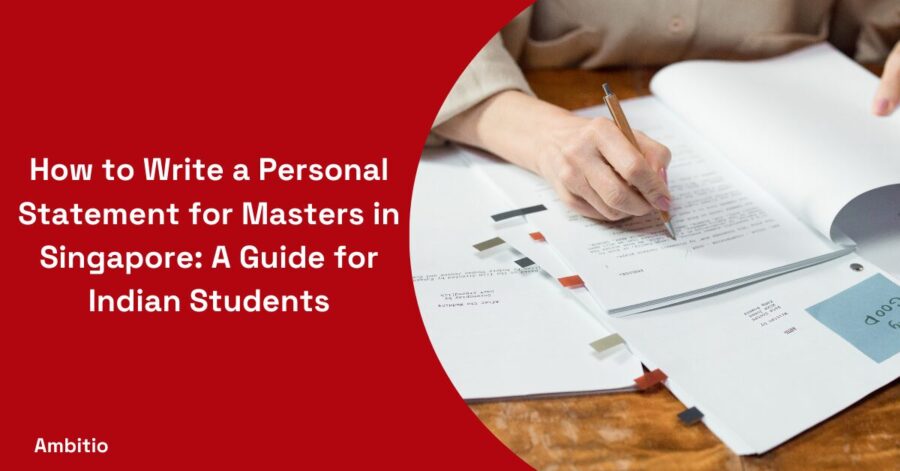15 April 2025
8 minutes read
How to Write a Personal Statement for Masters in Singapore: A Guide for Indian Students

Key Takeaways:
- Personal Statement for Masters in Singapore focuses on aligning your academic background and professional experiences with the program’s goals and your future career aspirations.
- Highlight why Singapore is your ideal study destination and how it aligns with your ambitions.
- Ensure clarity and conciseness in your statement; consider expert consultancy like Ambitio for a standout application.
Writing a personal statement for a master’s in Singapore could be the crucial factor in your application, especially for Indian students looking for premier universities such as NUS or NTU. The reality is, many students aren’t able to highlight their combination journey and growth, and they get lost in the noise with the piles of applicants. Without telling a story that shows deeply personal growth, skills and future goals, your application could simply be overlooked.
If you want to be noticed, you have to introspect about your journey, including your academic and professional journey. A good personal statement does not simply list your accomplishments, it connects the story of you to the program’s needs, while providing you the chance to contribute to the culture of the university!
Why Your Personal Statement Matters for Indian students in Singapore Universities?
Your personal statement for masters in Singapore is more than just a document, it’s your chance to showcase who you are, your journey of personal development, and your career aspirations. For Indian students, it’s essential to craft a strong personal statement that resonates with the admissions officer. The personal statement requirements for universities like NUS, NTU, and SMU demand a concise and forward-looking narrative that highlights relevant experiences and skills within the word limit.

A personal statement isn’t just about academic achievements; it’s about reflecting deeply on your professional experiences, extracurricular activities, and personal growth. When writing, aim to emphasise your unique identity while addressing the program requirements. By organizing your thoughts and brainstorming key points, you can create an effective personal statement that leaves a lasting impression on the admissions committee. Be sure to proofread and refine your draft to ensure it meets all the criteria, making it stand out authentically among many personal statements.
What Singapore Universities Look For in an Effective Personal Statement
When applying for postgraduate programs in Singapore, writing an effective personal statement for masters in Singapore is crucial for standing out in the university admissions process. Singapore’s top universities, such as National University of Singapore, Nanyang Technological University, and Singapore Management University, look for applicants who can provide a compelling narrative that reflects their academic goals, relevant experiences, and motivation for choosing Singapore as a study destination.

A strong personal statement for Indian students should connect your future plans with the program and demonstrate how your skills and experiences align with the academic opportunities provided by the university. Here’s what these universities typically look for:
Academic Goals and Alignment with the Course
Demonstrate how your academic program and future ambitions align with the course. Make clear why this specific program is the perfect fit for your career trajectory.
Relevant Experience and Skills
Highlight your skills and experiences, particularly those that showcase how you’ve applied knowledge in real-world scenarios. Reference any professional experiences, projects, or internships that are relevant to the course you’re applying for.
Motivation for Choosing Singapore
Share your genuine motivation for pursuing a degree in Singapore. Universities want to know why you’ve chosen Singapore universities over others and how the rich culture and dynamic learning environment will contribute to your personal growth and future career.
Cultural Fit and Future Aspirations
Demonstrate how you will thrive within the university’s diverse community. Cultural fit is key, so mention how your personal values align with the university’s ethos and how the program fits into your long-term career and future aspirations.
Introspection and Self-Improvement
Include a section on how your past challenges, including any adversity, have shaped your personal development. Show how you have grown and how you intend to continue this growth during your postgraduate journey.
By focusing on these key areas and weaving them into your personal statement, you’ll create a unique story that highlights your individuality and makes your application stand out. Be sure to reflect deeply, organize your thoughts, and craft a compelling and authentic personal statement that resonates with the admissions committee.
Structure of an Ideal Personal Statement for Indian Students
The structure of an ideal personal statement for Indian students applying to masters in Singapore is essential for creating a compelling application. A well-crafted personal statement should connect your academic and professional journey to your future goals, demonstrating why you’re an ideal candidate for the program.

Here’s how you can structure your personal statement for masters in Singapore to stand out and make a lasting impression.
1. Introduction – Start Strong
Begin by introducing yourself and capturing the reader’s attention. This is your chance to outline your academic background and career goals in relation to your future aspirations. Consider starting with a personal statement example or a short anecdote that showcases your motivations. The introduction should set the tone for the rest of the essay. Reflect on your journey and outlook on life to give context to your academic path.
2. Academic Background and Motivation
Discuss your academic journey and what drives you to pursue further studies. Specifically, explain why you are drawn to the course you are applying for at Singapore universities. Make connections between the skills you’ve gained and the program’s offerings. Draw from US personal statement styles and focus on gaining valuable knowledge that will support your long-term goals.
3. Relevant Experience and Skills
Highlight any relevant experiences that are tied to the academic program. This can include work experience, internships, projects, or extracurricular activities. Explain how these experiences have gained you valuable knowledge and prepared you for success in the program. This section should focus on professional experiences and skills that align with your chosen field. Mention any leadership roles or extracurricular activities that have contributed to your personal growth.
4. Why Singapore?
Explain your decision to study in Singapore. Discuss what makes Singapore an ideal destination for your academic and career aspirations. Reflect on Singapore’s rich culture and how it aligns with your personal and academic goals.
5. Future Career Plans
Conclude your personal statement by discussing your future career ambitions. How will the program help you achieve these goals? Be forward-looking and explain how studying at a top Singapore university will open doors for you. Discuss your future aspirations and how you plan to contribute to your field. Plan what you intend to achieve during your postgraduate studies and after graduation.
6. Conclusion – Make Your Statement Stand Out
Finish your personal statement by summarizing your key points and reinforcing why you are a perfect fit for the program. This is where you conclude your personal statement with a memorable statement that highlights your unique identity and commitment to the academic journey. Always proofread and ensure your personal statement is concise and within the word limit.
By following this structure and using essential tips on how to write a personal statement, you’ll be able to craft a compelling narrative that stands out to university admissions committees. A well-organized personal statement ensures that all focal points are covered, from your academic background to your future plans, setting you up for success in your application process.
Expert Tips for Indian Students Writing Their SOP for Singapore Masters
Writing a personal statement for masters in Singapore can be challenging for Indian students, but with the right approach, you can craft a statement that stands out. Here are five expert tips to help you write an impactful personal statement that meets the expectations of top Singapore universities:
1. Start Writing Early and Plan Ahead
Begin drafting your personal statement well in advance. Singapore students often face pressure from application deadlines, so it’s essential to start writing early. Use mind maps to brainstorm key points you want to include, such as your academic goals and motivations for choosing Singapore. Learn how to write your SOP by looking at a NUS personal statement example and making connections to your own experiences.
2. Highlight Your Academic and Professional Journey
When writing your statement of purpose, make sure to highlight your academic achievements and relevant professional experiences. Ensure that the applicant’s personal story aligns with the program’s requirements. Focus on skills and experiences that demonstrate your readiness for a masters in Singapore program, just like US universities expect in their SOPs.
3. Be Authentic and Personal
A personal statement should reflect your authentic voice. Avoid clichés and focus on beyond academic aspects of your journey. Talk about your personal growth, challenges, and how they shaped your future goals. Your personal statement should not just be a list of accomplishments. Create a compelling narrative that gives insight into your personal development.
4. Draw Connections Between Your Past and Future Goals
In your SOP, show how your previous experiences align with your future aspirations. Draw connections between your academic journey and the academic program you wish to pursue in Singapore. Make your personal statement stand out by demonstrating a clear path from past experiences to future ambitions, emphasizing how this masters in Singapore fits into your long-term career plan.
5. Proofread and Seek Expert Advice
Don’t overlook the importance of proofreading your personal statement. Mistakes or unclear points can weaken your application. Consider seeking consultancy or feedback from someone who has experience with Singapore personal statement writing. Review common mistakes that applicants make and ensure your statement is concise while also making a lasting impression.
By following these tips, you can create a strong personal statement for masters in Singapore that not only reflects your academic potential but also your unique journey and future plans.
10 Top Universities in Singapore to Study Masters for Indian Students
Singapore is known for its high-quality education system, attracting students from around the world, especially Indian students, seeking excellent postgraduate opportunities. With top-ranked universities offering cutting-edge programs, Singapore has become a sought-after destination for higher education. To make the most out of your application, a personal statement for masters in Singapore is essential, as it helps you showcase your potential and align your aspirations with the university’s values.
Below is a table of the top universities in Singapore for Indian students to pursue their master’s degrees, along with key details on average tuition fees, average salary, and exams required.
| University | Average Tuition Fees (SGD) | Average Salary After Graduation (SGD) | Exams Required |
|---|---|---|---|
| National University of Singapore (NUS) | 20,000 – 45,000 | 50,000 – 70,000 | GRE/GMAT, TOEFL/IELTS |
| Nanyang Technological University (NTU) | 18,000 – 38,000 | 45,000 – 65,000 | GRE/GMAT, TOEFL/IELTS |
| Singapore Management University (SMU) | 25,000 – 40,000 | 55,000 – 80,000 | GRE/GMAT, TOEFL/IELTS |
| Singapore University of Technology and Design (SUTD) | 22,000 – 38,000 | 50,000 – 70,000 | GRE, TOEFL/IELTS |
| INSEAD Singapore | 80,000 – 100,000 | 90,000 – 120,000 | GMAT, TOEFL/IELTS |
| ESSEC Business School Singapore | 60,000 – 80,000 | 75,000 – 110,000 | GMAT, TOEFL/IELTS |
| Yale-NUS College | 30,000 – 45,000 | 50,000 – 75,000 | GRE/GMAT, TOEFL/IELTS |
| Republic Polytechnic | 10,000 – 20,000 | 40,000 – 55,000 | TOEFL/IELTS |
| NUS Business School | 40,000 – 60,000 | 60,000 – 90,000 | GMAT, TOEFL/IELTS |
| S. Rajaratnam School of International Studies (RSIS) | 20,000 – 35,000 | 45,000 – 60,000 | GRE/GMAT, TOEFL/IELTS |
When applying, ensure your personal statement highlights key points like why you intend to write to this particular university, how your previous experience aligns with your future goals, and what you plan to achieve post-graduation. Supplemental essays may also be required, so be sure to refine your content to emphasize your unique experiences and future ambitions.
Conclusion
Your personal statement for masters in Singapore is a crucial document that can make or break your application. For Indian students, it’s important to highlight your academic achievements, personal experiences, and future goals in alignment with the program you’re applying for. The personal statement must be a compelling reflection of your journey, ensuring you stand out in a competitive pool of applicants.
If you need expert guidance in crafting a strong statement, Ambitio offers personalized consultancy to help you write a standout application. Reach out today and take the first step towards your dream university!
FAQs
What is a personal statement for a master’s application in Singapore?
A brief essay showcasing your background, motivations, and fit for the program.
What should I include in my personal statement?
Include your academic achievements, relevant experience, career goals, and reasons for choosing the program.
What is the typical word or character limit?
Usually 200–300 words or about 2,000 characters, but check each university’s requirements.
Can I use the same personal statement for all universities?
No, tailor each statement to the specific university and program.
How do I make my personal statement stand out?
Be authentic, use specific examples, and clearly link your goals to the program.
What are common mistakes to avoid?
Avoid being generic, exceeding word limits, and making grammatical errors.
Any tips for writing an effective personal statement?
Start early, research the program, and get feedback before submitting.

You can study at top universities worldwide!
Get expert tips and tricks to get into top universities with a free expert session.
Book Your Free 30-Minute Session Now! Book a call now




























